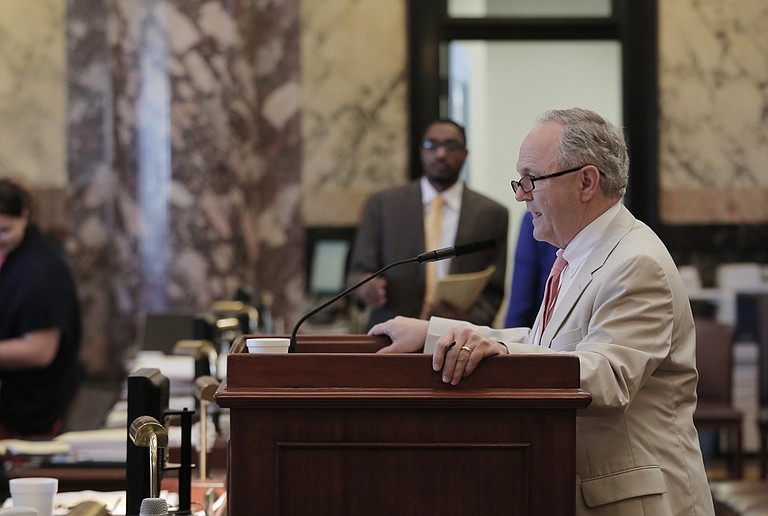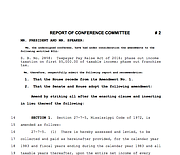Senate Appropriations Chairman Sen. Buck Clarke, R-Hollandale, asked the Senate to recommit several budget bills on Monday morning before the midnight deadline to pass the state's budget. Photo by Imani Khayyam.
Tuesday, April 19, 2016
Late into Monday night, Mississippi lawmakers managed to pass a strained budget, a $415 million tax cut and $250 million in bonds before midnight to meet yesterday's deadline for budget and revenue bills.
On Monday morning, some state agency budgets were still not finalized. Last weekend, both House Appropriations Committee Chairman Herb Frierson, R-Poplarville, and Senate Appropriations Committee Chairman Buck Clarke, R-Hollandale, said they had to cut about $73 million from earlier budget plans due to lower revenue estimates. Frierson and Clarke said many agencies would take reductions varying from 2 percent to 12 percent, the Associated Press reported.
Early Monday, some lawmakers were wary of the large tax-cut bill sitting on the calendar and asked if its potential effects on the budget was considered in the budgeting process.
Sen. David Blount, D-Jackson, asked Senate Appropriations Chairman Buck Clarke, R-Hollandale, if tax cuts were being calculated into budget allotment when House Bill 1637 came to the Senate floor. That bill would draw funding from the general-fund budget for the Office of the Capital Post-Conviction Counsel.
"So the budget that this bill is a part of and the overall budget makes no allowance for any tax cut that may affect them in the next budget year is that correct?" Blount asked.
Clarke said the Taxpayer Pay Raise Act would cost the state $3 million in fiscal-year 2017. On Monday morning, that bill was still sitting on the calendar and had yet to be taken up, and Clarke said he was sure that appropriations bills would be adjusted with tax bills, particularly the ones that had been re-committed.
"I am working with the budget that I've got, and I will look at that, as I've said, it's an ongoing process with many moving parts and there are a lot of bills that were recommitted," Clarke said.
In the House, budget cuts continued to spark an outcry among Democrats. Lawmakers cut the Mississippi Department of Human Services budget by 13.9 percent, while allocating enough funding for the state's foster-care system to avoid federal receivership.
Rep. Steve Holland, D-Plantersville, questioned Public Health Committee Chairman Rep. Sam Mims, R-McComb, about how MDHS would survive the cut.
"How do you think they are going to get through the year?" Holland asked.
"They are going to have a tough time," Mims said. "They are going to have to make some changes, and it's a difficult situation."
As cuts continued, representatives asked why some agencies received funding above the legislative budget recommendation while other agencies like the state's departments of health and mental health took large cuts last weekend.
Progress was slow during the day because conferees on budget bills had to keep meeting and re-filing conference reports. Before the House finished budget bills, House Ways and Means Chairman Rep. Jeff Smith, R-Columbus, brought the Taxpayer Pay Raise Act up to the floor for a vote.
Senate Bill 2858 has changed, somewhat, from its original form, but after conference, has retained some of its original proposed tax cuts. The bill, authored by Sen. Joey Fillingane, R-Sumrall, originally aimed to cut taxes for the 3 and 4 percent income-tax brackets (the two lowest), the corporate franchise tax, and small business and self-employment taxes. After the House gutted the majority of cuts in the bill earlier this month, the Senate did not concur on their changes.
Late Sunday night, the bill came out of conference, forcing legislators to vote on the tax cut less than 24 hours later. The latest iteration of the Taxpayer Pay Raise Act would phase out the 3 percent income tax as well as phase out the franchise and self-employment taxes.
Smith told the House that the bill now pushed everything off for two years because most of the cuts in the bill do not take effect until 2018.
"You need to think real hard about this because it's not going to be done for two years," Smith said.
Holland told Smith that almost every state agency has experienced some kind of decrease in funding this session and said in his quick calculations that social-services agencies alone have experienced close to $60 million worth of cuts. Smith said an upcoming tax study will evaluate comprehensive tax reform in Mississippi by September; the Legislature can consider the results in the next session.
"You're asking this body to throw out a big ole piece of red meat to the base of taxpayers out here for those amongst you that just might just be running for governor in four years or lieutenant governor or whatever," Holland said.
"I can assure you sir I'm not running," Smith said. "Except for the county line."
The House barely passed the bill by a vote of 74-43. The bill needed 71 votes to pass, and seven Democrats voted for the bill.
Department of Revenue estimates say the bill would divert $415 million from the state's general fund in the next 12 years; this is a drop from the initial estimate of the first version of the bill, which would have cost the state $575 million.
Franchise and income tax cuts would not take effect until 2018 if the bill becomes law, but the self-employment tax cut would divert about $3 million from the budget starting on July 1.
The House later passed a $250-million bond bill, largely to be used for Institutions of Higher Learning construction projects. One of the last budget bills to pass included allocations for some of the state's BP Oil settlement money. Frierson explained that $38.45 million of the BP money will go to several projects, most located on or near the coast including some campus buildings at the University of Southern Mississippi, scholarships, a national diabetes research center and the state's bicentennial commission.
When the Taxpayer Pay Raise Act came back to the House, some senators voiced their displeasure. Sen. Hob Bryan, D-Amory, and Sen. David Blount, D-Jackson, spoke against the bill.
"We have a general fund that is unable to care for the basic needs of the state," Bryan said. "And yet we are giving away the equivalent of 7 percent of the general fund away."
Fillingane said that every person in the state who pays income tax would "get an equal cut" and echoed Smith, saying the bill will not take effect for two years.
Blount said the vote on Senate Bill 2858 is the "most consequential vote of the session."
"If you vote for this, you can't say you voted to increase the budgets," Blount said.
Blount acknowledged that he won't be able to run for re-election saying he voted for a tax cut but told senators that they cannot have it both ways. "You've got to own up and serve the needs of the people through the state budget," Blount said. "You can't have it both ways—you cannot."
Lt. Gov. Tate Reeves praised the tax cut bill's passage.
"I believe that we shouldn't base tax policy on revenues in any one fiscal year. That's why you've seen a plan that's passed the House and the Senate which doesn't affect revenues in FY2017 and has minimal effects in FY18," Reeves told reporters late last night. "We're going to give every person who pays income taxes in our state a pay raise."
The Taxpayer Pay Raise Act passed the Senate by a vote of 36-14 and heads to the governor's desk with the rest of the budget bills and the big bond bill.
For more legislative coverage visit jfp.ms/state. Follow state reporter Arielle Dreher on Twitter @arielle_amara.


Comments
Use the comment form below to begin a discussion about this content.
Sign in to comment
Or login with:
OpenID